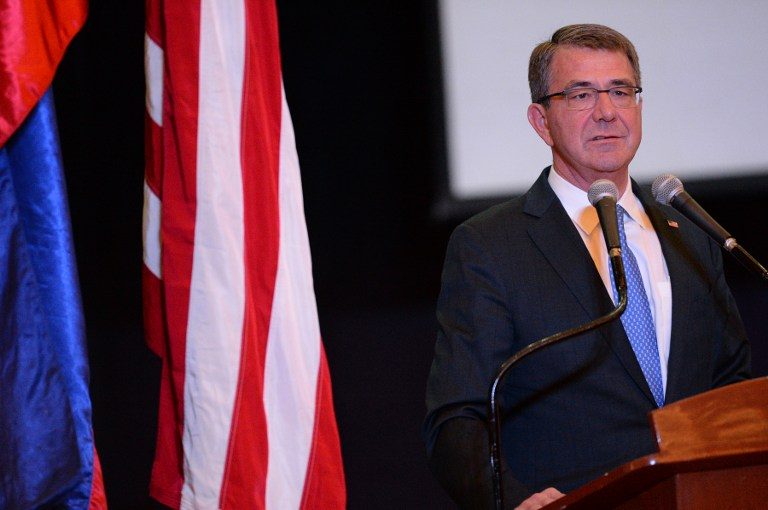SUMMARY
This is AI generated summarization, which may have errors. For context, always refer to the full article.

KO OLINA, USA (UPDATED) – Pentagon chief Ashton Carter on Friday, September 30, criticized the “deeply troubling” remarks by Philippine President Rodrigo Duterte, in which he likened his deadly war on crime to Hitler’s efforts to exterminate Jews.
Carter’s comments came during a regional security summit with Southeast Asian ally nations, where he sought to reassure counterparts that America’s ongoing commitment to its Asia “rebalance” would continue into the next US administration.
Earlier on Friday, Philippine President Rodrigo Duterte had made televised remarks drawing parallels between his campaign to wipe out his country’s drug problem and Adolf Hitler’s genocidal drive.
“Hitler massacred 3 million Jews. Now there are 3 million drug addicts (in the Philippines). I’d be happy to slaughter them,” Duterte told reporters in his home city of Davao.
Carter said the remarks were not discussed at the summit.
But “speaking personally for myself, I find those comments deeply troubling,” he added.
‘Two entirely different things’
Early Saturday, October 1, Presidential Spokesperson Ernesto Abella said Duterte’s reference to Hitler and the Holocaust “was an oblique deflection of the way he has been pictured as a mass murderer, a Hitler, a label he rejects.”
According to Abella, Duterte was just addressing this negative comparison.
“He likewise draws an oblique conclusion, that while the Holocaust was an attempt to exterminate the future generations of Jews, the so-called ‘extra-judicial killings’, wrongly attributed to him, will nevertheless result in the salvation of the next generation of Filipinos,” Abella said in a statement.
He said Hitler’s murder of 3 million innocent civilians and Duterte’s “willingness to kill” 3 million criminal drug dealers “to save the future of the next generation and the country” are “two entirely different things.”
“The Philippines recognizes the deep significance of the Jewish experience especially their tragic and painful history. We do not wish to diminish the profound loss of 6 million Jews in the Holocaust – that deep midnight of their story as a people,” he said.
Foreign Secretary Perfecto Yasay Jr also came to the defense of the President, calling the news on Duterte’s remarks “a malicious spin to sow hatred, against President Duterte and destabilize the country.”
In a Facebook post early Saturday, Yasay said Duterte “clearly and contextually” assured the people he was not waging war against illegal drugs to exterminate more than 3 million drug users in the country the way Hitler’s Nazis exterminated Jews during World War II.
“His avowed goal and promise to the people for which he was voted into the highest office by an overwhelming mandate was to eliminate illegal drugs that has spawned further heinous acts of criminality and widespread corruption in all levels of government and make our communities safe, secure and productively,” he added.
‘Informal’ meeting
The “informal” meeting of the Association of Southeast Asian Nations (ASEAN), held on Oahu in Hawaii, focused mainly on longer-standing regional issues such as continued unease over China’s growing reach across the South China Sea.
Beijing has in recent years rapidly expanded its physical presence in the strategically vital waterway, turning small maritime features, islets and reefs into much larger islands capable of holding military facilities.
Carter has repeatedly stressed that the US military will ignore Beijing’s contentious South China Sea claims, and keep operating in waters and airspace surrounding the islands.
“The United States would like to help all our nations see more, share more, and do more to keep Southeast Asia’s vital waterways open and secure,” Carter said earlier Friday.
Another topic high on the agenda was the rise in Islamic State-affiliated groups, especially in Indonesia, Singapore, Malaysia and the Philippines, as well as the return from Iraq and Syria of war-hardened jihadists.
“I was able to describe how the defeat of (ISIS) in Iraq and Syria would demonstrate that there is no state based upon (their) Ideology,” he said.
But “I also expected to see real and attempted metastases to ASEAN nations.”
Ongoing ‘pivot’
America’s rebalance to Asia – or “pivot,” as it is sometimes called – has been a cornerstone of President Barack Obama’s foreign policy, with a shifting of focus away from the Middle East and toward the Asia-Pacific region.
He has mended relations with Myanmar, Vietnam and Laos while bolstering regional blocs and providing a counterbalance to China’s regional ambitions.
Indonesia, Malaysia and the Philippines recently agreed to conduct joint sea patrols to fight piracy, organized crime, and terrorist activity in the Sulu Sea.
A senior US defense official, speaking on condition of anonymity, said he was confident America would retain its Asia focus whatever the result of November’s presidential election.
“We’ve got a good thing going,” he said.
“There are a lot of opportunities left over. And we want to make sure that our position in the region is solid for the next president.”
The Pentagon chief met privately with all 10 defense ministers, including the Philippines’ Delfin Lorenzana, a former diplomat who lived for 14 years in Washington.
Carter said the two had “very good” discussions about the continuation of the two countries’ military alliance, which dates back more than 60 years, and which the Pentagon chief on Thursday, September 29, said was “ironclad.”
Their meeting drew intense scrutiny following Duterte’s Hitler comments, and other remarks earlier this week in which he vowed to end joint military exercises with the United States.
The firebrand leader has also called Obama a “son of a whore” and extended overtures to China, potentially upsetting the strong US-Philippine alliance.
Lorenzana declined to comment on his president’s comments when contacted by Agence France-Presse. – Rappler.com
Add a comment
How does this make you feel?
There are no comments yet. Add your comment to start the conversation.